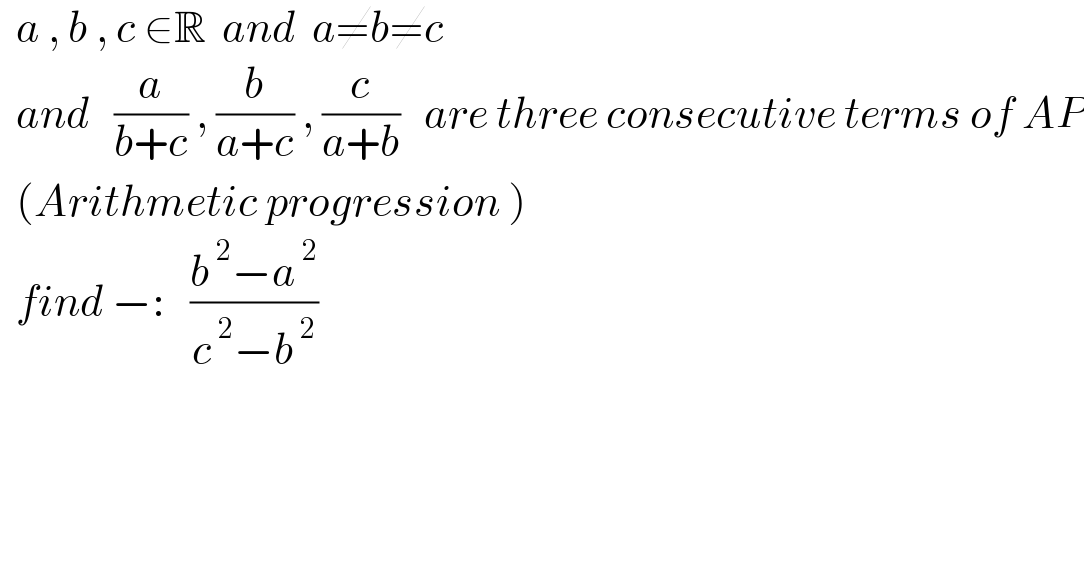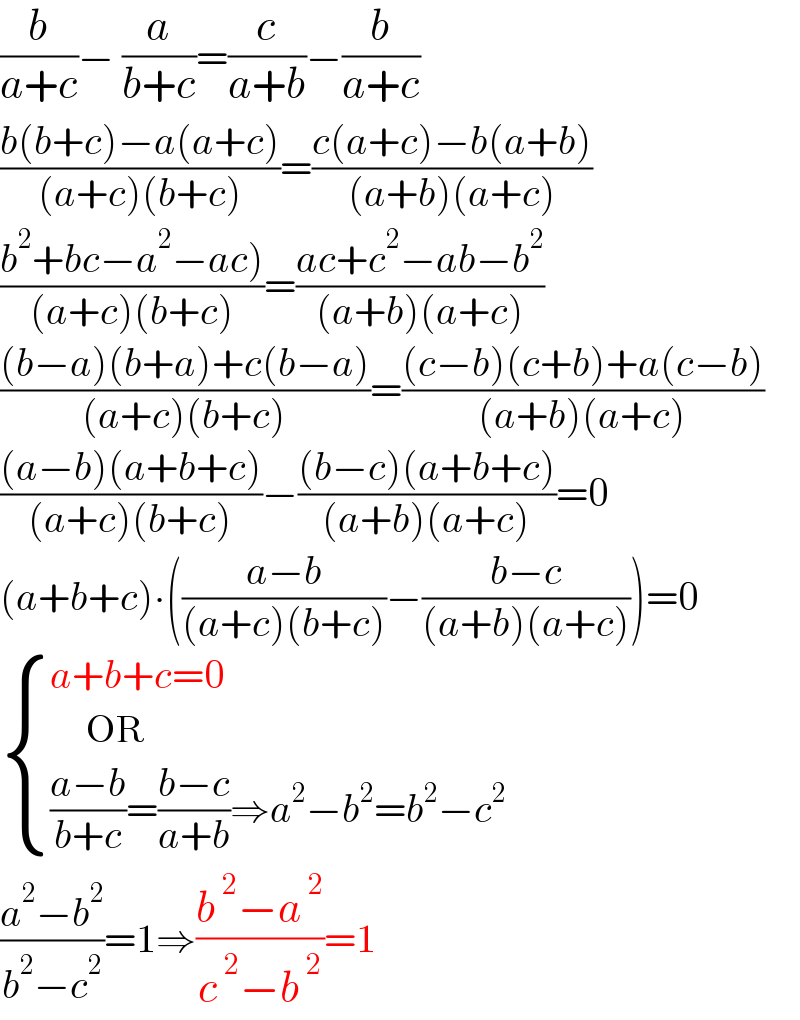
Question Number 171403 by mnjuly1970 last updated on 14/Jun/22

$$\:\:{a}\:,\:{b}\:,\:{c}\:\in\mathbb{R}\:\:{and}\:\:{a}\neq{b}\neq{c} \\ $$$$\:\:{and}\:\:\:\frac{{a}}{{b}+{c}}\:,\:\frac{{b}}{{a}+{c}}\:,\:\frac{{c}}{{a}+{b}}\:\:\:{are}\:{three}\:{consecutive}\:{terms}\:{of}\:{AP} \\ $$$$\:\:\left({Arithmetic}\:{progression}\:\right) \\ $$$$\:\:{find}\:−:\:\:\:\frac{{b}^{\:\mathrm{2}} −{a}^{\:\mathrm{2}} }{{c}^{\:\mathrm{2}} −{b}^{\:\mathrm{2}} } \\ $$
Answered by Rasheed.Sindhi last updated on 15/Jun/22

$$\frac{{b}}{{a}+{c}}−\:\frac{{a}}{{b}+{c}}=\frac{{c}}{{a}+{b}}−\frac{{b}}{{a}+{c}} \\ $$$$\frac{{b}\left({b}+{c}\right)−{a}\left({a}+{c}\right)}{\left({a}+{c}\right)\left({b}+{c}\right)}=\frac{{c}\left({a}+{c}\right)−{b}\left({a}+{b}\right)}{\left({a}+{b}\right)\left({a}+{c}\right)} \\ $$$$\frac{\left.{b}^{\mathrm{2}} +{bc}−{a}^{\mathrm{2}} −{ac}\right)}{\left({a}+{c}\right)\left({b}+{c}\right)}=\frac{{ac}+{c}^{\mathrm{2}} −{ab}−{b}^{\mathrm{2}} }{\left({a}+{b}\right)\left({a}+{c}\right)} \\ $$$$\frac{\left({b}−{a}\right)\left({b}+{a}\right)+{c}\left({b}−{a}\right)}{\left({a}+{c}\right)\left({b}+{c}\right)}=\frac{\left({c}−{b}\right)\left({c}+{b}\right)+{a}\left({c}−{b}\right)}{\left({a}+{b}\right)\left({a}+{c}\right)} \\ $$$$\frac{\left({a}−{b}\right)\left({a}+{b}+{c}\right)}{\left({a}+{c}\right)\left({b}+{c}\right)}−\frac{\left({b}−{c}\right)\left({a}+{b}+{c}\right)}{\left({a}+{b}\right)\left({a}+{c}\right)}=\mathrm{0} \\ $$$$\left({a}+{b}+{c}\right)\centerdot\left(\frac{{a}−{b}}{\left({a}+{c}\right)\left({b}+{c}\right)}−\frac{{b}−{c}}{\left({a}+{b}\right)\left({a}+{c}\right)}\right)=\mathrm{0} \\ $$$$\begin{cases}{{a}+{b}+{c}=\mathrm{0}}\\{\:\:\:\:\:\:\mathrm{OR}}\\{\frac{{a}−{b}}{{b}+{c}}=\frac{{b}−{c}}{{a}+{b}}\Rightarrow{a}^{\mathrm{2}} −{b}^{\mathrm{2}} ={b}^{\mathrm{2}} −{c}^{\mathrm{2}} }\end{cases} \\ $$$$\frac{{a}^{\mathrm{2}} −{b}^{\mathrm{2}} }{{b}^{\mathrm{2}} −{c}^{\mathrm{2}} }=\mathrm{1}\Rightarrow\frac{{b}^{\:\mathrm{2}} −{a}^{\:\mathrm{2}} }{{c}^{\:\mathrm{2}} −{b}^{\:\mathrm{2}} }=\mathrm{1} \\ $$
Commented by Rasheed.Sindhi last updated on 15/Jun/22

$$\mathcal{T}{he}\:{condition}\:{should}\:\:{be}\:{a}+{b}+{c}\neq\mathrm{0} \\ $$$${instead}\:{of}\:{a}\neq{b}\neq{c} \\ $$
Commented by Rasheed.Sindhi last updated on 15/Jun/22

$$\mathcal{T}{hanks}\:{sir},\:{you}'{re}\:{right}. \\ $$
